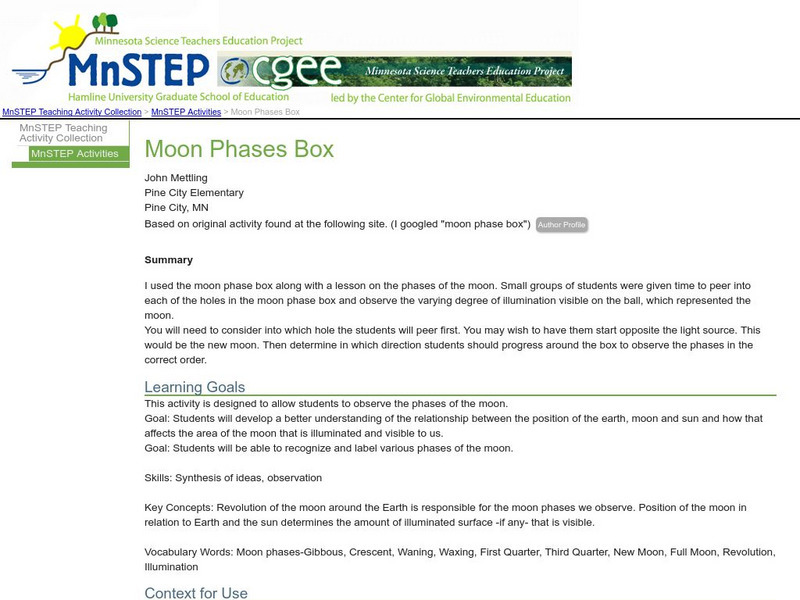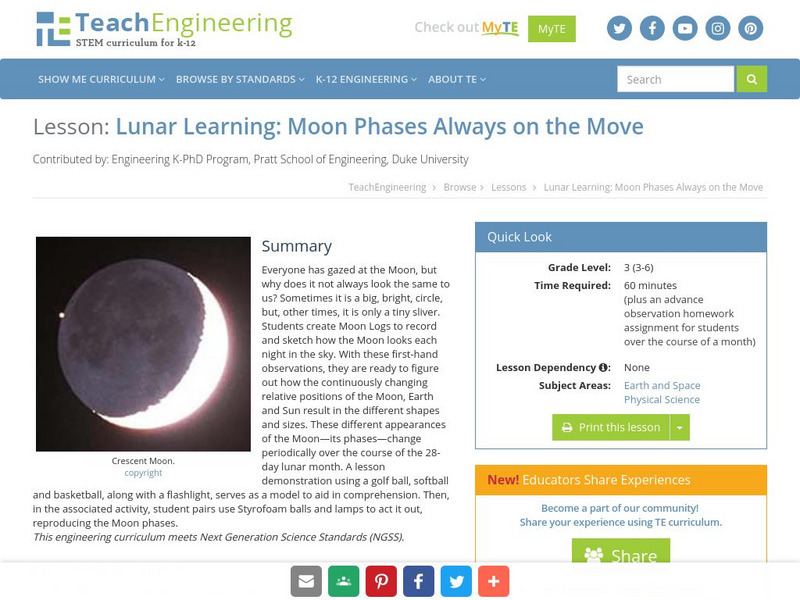Hi, what do you want to do?
Curated OER
Science Videos
Students plan, practice, and act in a 2-3 minute videotaped production about a specific topic. Students from a local high school give presentations pertaining to seasons, earth rotation, and moon phases. Students analyze the...
Curated OER
Tides
Students discover how the position of the Sun, Moon and Earth affect tides. In this science instructional activity, students view a presentation about the tides. Students discuss the different types of tides.
Curated OER
Earth's Revolution and Rotation
Eighth graders investigate the regular motions of the sun, Earth and the moon and explain how these are related to days, years, seasons, eclipses, tides and moon cycles. They participate in an exercise where they explore the...
Curated OER
Solar and Lunar Eclipses
Learners examine eclipses. In this eclipse lesson, students investigate solar and lunar eclipses. Learners complete a WebQuest and write a descriptive summary of eclipses. Lesson references a WebQuest, but does not include a link.
Curated OER
Moon Observations
Students study the science of the moon. In this moon observations lesson, students study vocabulary associated with the moon, study a lunar calendar, and a phases of the moon's orbit around the Earth.
Curated OER
The Nine Planets
A solid activity on teaching the nine planets in our solar system is here for you. In it, young scientists learn the correct order of the planets, and they choose one of the planets to do a research report on. They must come up with five...
Curated OER
Astronomy
Pupils explore space science by utilizing education software. In this moon cycles lesson, students discuss the importance of the moon and the different phases we observe from earth. Pupils demonstrate the earth's orbit by creating a...
Curated OER
Eclipses
In this eclipses worksheet, students read about solar and lunar eclipses to complete 8 short answer questions comparing the two types of eclipses.
Curated OER
3rd Rock from the Sun's Baby Rock
Seventh graders have a chance to actively see each phase of the moon and make connections to what they see in the sky when you show how the moon goes through each of the phases.
Curated OER
Learning Lesson: Moonlight Serenade
Students complete experiments as they act as the earth. They observe how different angles affect the phases of the moon seen by us. They discuss the differences in light and dark.
Curated OER
Let the North Star Tell You Where You Are
Students participate in activities in which they find the Big Dipper and locate the North Star in the night sky, examine the relationship between the angle to Polaris and latitude, and determine latitude by using an astrolabe.
Curated OER
Our Sky Clock
Learners explore space science by completing a worksheet in class. In this astronomy lesson, students discuss and identify star patterns in the night sky and relate these patterns to the approximate time they appear. Learners complete an...
Curated OER
Astronomical Data
In this astronomy worksheet, students use a chart with planetary data comparing the inner planets to each other. Students will use the period of rotation, period of revolution, and distance from the sun for these inner planets to...
Curated OER
The Tides of Change Worksheet (Part 1)
In this science worksheet, 1st graders track the tides of the ocean for a number of days and examine the data to determine the meaning of the pattern.
Curated OER
Tides
Students graph 40 days of high and low tide data for a site in Baja, Mexico near the Wetlands & Fisheries Live! research center. They identify patterns in the data and finally to make a connection between tidal heights and the phase...
Curated OER
Let the North Star Tell You Where You Are
Students create an astrolabe and locate the North Star in the night sky. They determine the latitude of the North Star, and calculate an average latitude based on class results.
Utah State Office of Education
Utah Science: What's Up There Anyway?
Far out there we observe the moon, its phases, and its constant changing position as we sit on a swing in the backyard. Investigate the science behind the moon through the activities provided.
Science Education Resource Center at Carleton College
Serc: Moon Phases Box
This activity is designed to allow students to observe and recognize the phases of the moon. They will develop a better understanding of the relationship between the position of the earth, moon and sun and how that affects the area of...
TeachEngineering
Teach Engineering: Lunar Learning
Why does the Moon not always look the same to us? Sometimes it is a big, bright, circle, but, other times, it is only a tiny sliver, if we can see it at all. The different shapes and sizes of the slivers of the Moon are referred to as...
CK-12 Foundation
Ck 12: Physics Simulation: Phases of the Moon
[Free Registration/Login Required] Learn how the steady motion of the Moon around the Earth, and the phases created by the relative position of the Earth, Sun, and Moon, allow us to tell time by simply looking at the shape and...
ClassFlow
Class Flow: Phases of the Moon
[Free Registration/Login Required] This flipchart demonstrates how the positions of the Earth, Moon and Sun cause phases of the Moon. It also illustrates the positions of the Earth, Moon, and Sun during a day and a month's time.
TeachEngineering
Teach Engineering: Lunar Lollipops
The students work in teams of two to discover the relative positions of the Earth, Sun and Moon that produce the different phases of the Moon. The students will be given a Styrofoam ball that they will attach to a pencil so that it looks...
Utah Education Network
Uen: Patterned Paragraphs
Students will learn about the importance of including specific details when writing. Students will watch the teacher model "How to Make a Peanut Butter Sandwich." Then student will replicate the process for writing with specificity as...



























